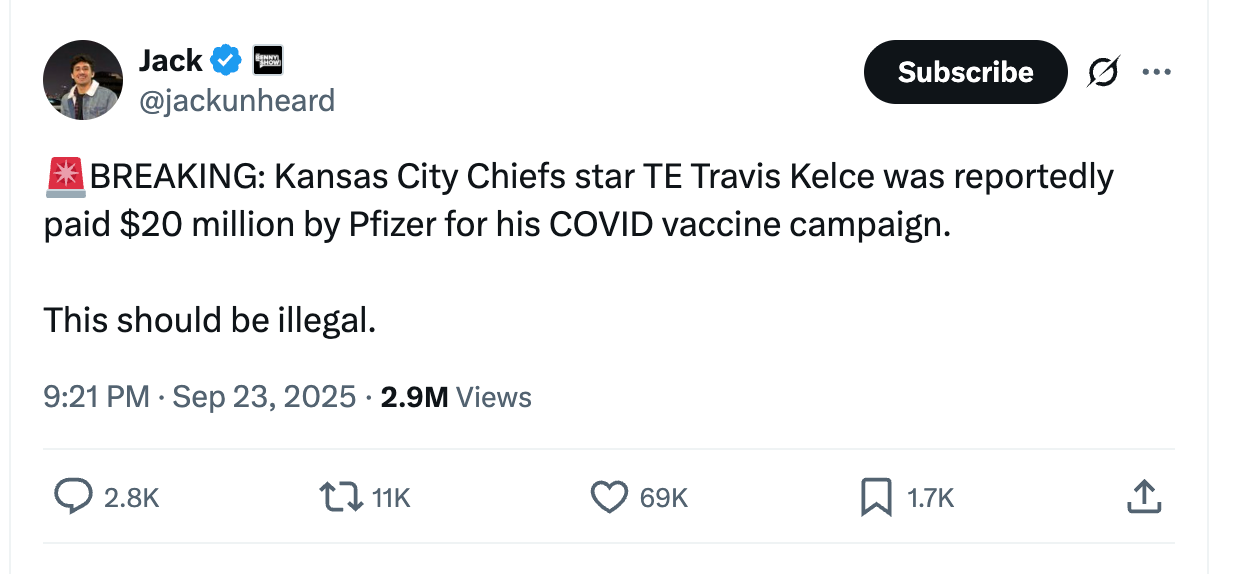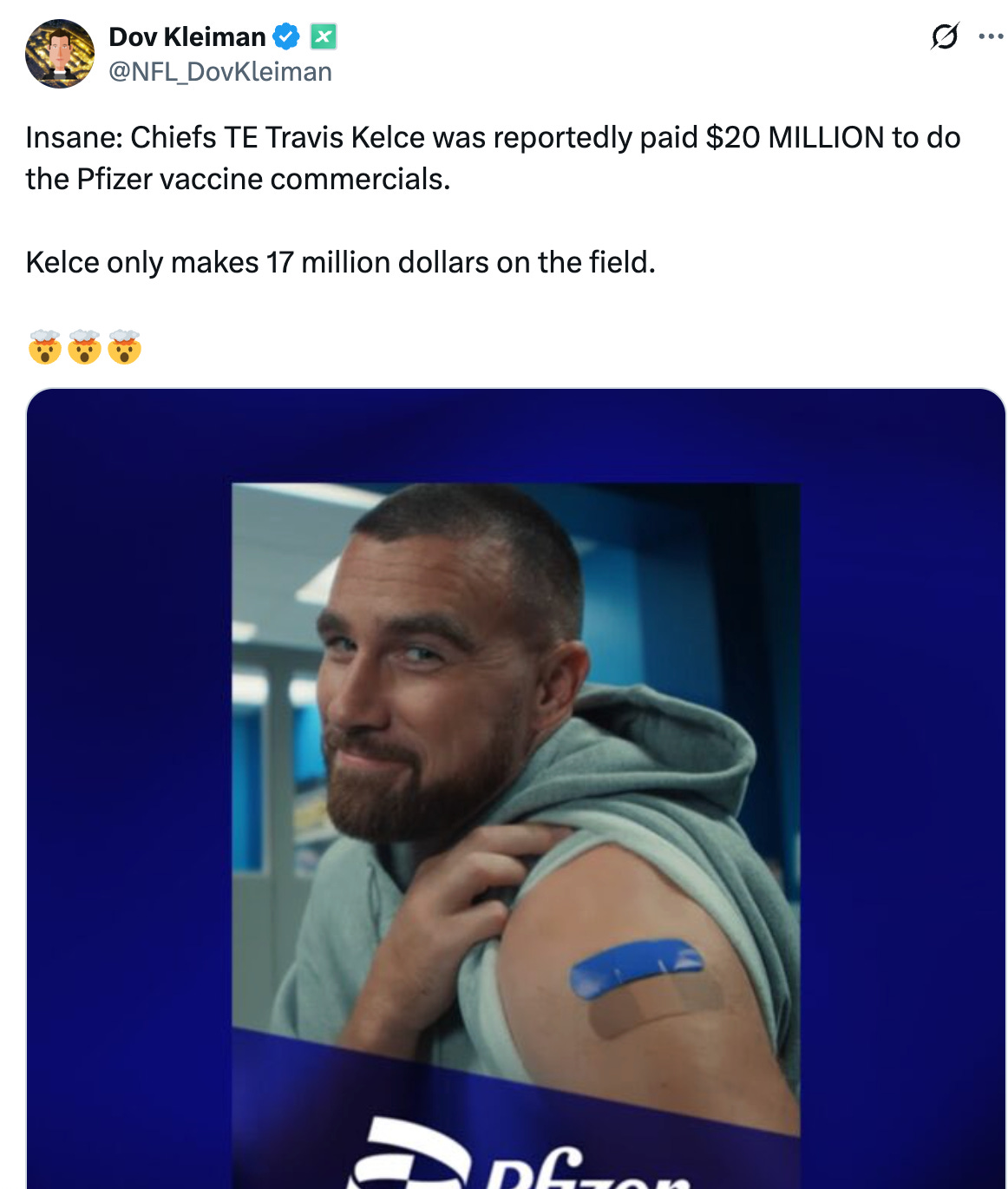Fin: ‘One Battle After Another’ does not require the validation of box office success
Plus, a $20 million Travis Kelce factoid that won’t die, the New York Film Festival experience, Jimmy Kimmel is back, and Macho Man at the movies
A couple of weeks ago, I went to a movie screening, which was followed afterwards by a Q&A. The screening was held near a college, and so many of the people there (though not all) were college students. And in their questions, I noticed something: Many of the questions seemed to be less about the movie itself, but about its box office potential.
Some speculated that the movie might not perform well in theaters, but would likely hit big once it hit streaming. Others were curious about the film’s potential for broader appeal. And of course, there was also speculation about that movie’s Oscar chances.
I’m not picking on those people at that screening necessarily, but this attitude is everywhere, whether it’s critics, YouTubers, or Film Twitter: This obsession with the box office, and the business side of the movies, and the way speculation about the financial performance of a movie is somehow as frequent and worthy a topic as the quality of the movie itself.
This is starting to dominate the conversation about One Battle After Another, Paul Thomas Anderson’s new film, which opens in theaters today. Reaction to the film from critics has been nearly rapturous, with many (myself included) calling it the best movie of the year so far. But all year long, discussion about One Battle has centered on the possibility that it might not be a huge box office hit, that it could lose money, and, more recently, whether it will break Warner Bros’ streak of consecutive $40 million-or-more openings.
First of all, if you’re paying attention to a box office streak by a major studio, you shouldn’t be. If you’re paying any mind to a corporation’s bottom line, and you don’t work there or own their stock, you REALLY shouldn’t be. And if your attitude is that if a movie loses money for its studio, then it was therefore a mistake for it to have been made at all, then, well, you probably shouldn’t be watching movies in the first place.
Leonardo DiCaprio had some quotes published this week, in which he discussed how “box office is important,” but that was the headline on a story in which the full quote was “box office is important because it means people are in the seats going to theater, going to have that communal experience.”
I suspect that One Battle After Another might not be a major hit right out of the gate, but I also think that it will build up an audience over time, and have positive word of mouth. It’s also worth noting that PTA has never really had a massive global hit, and the current tracking numbers would represent the biggest opening of his career.
I can understand wanting to root for a film you like to be seen by more people, or a filmmaker you like having success, in a way that will give that more freedom to make the projects they want in the future.
But if you’re someone who cares about film, this type of stuff really shouldn’t be at or even near the top of your mind, as the movie’s release approaches. Whether or not One Battle After Another has a strong opening weekend is, in the end, one of the least interesting things to think about it.
Leonardo DiCaprio and Benicio Del Toro, in a quest to deliver that hopeful box office success, appeared this week on Jason and Travis Kelce’s podcast, not exactly their normal venue:
And speaking of Travis Kelce, and this newsletter’s longtime hobbyhorses…
Travis Kelce, Pfizer, $20 million, and the feedback loop of low-stakes fake news
I saw the following post on X this week, one with nearly 3 million views:
Just about everything in that post is wrong. It’s not “breaking” — this was first alleged in 2023 —while there’s no reason why an athlete endorsing a public company can, or would, be illegal.
Also, there’s absolutely zero sourcing for the claim that Travis Kelce was paid $20 million to endorse Pfizer.
Kelce did, indeed, appear in an ad campaign for Pfizer, back in 2023, in which he encouraged people to get both their COVID booster and flu shot at the same time. This was controversial at the time — fellow NFL player and anti-vax crank Aaron Rodgers dubbed him “Mr. Pfizer — and there were pieces arguing that celebrity endorsements for pharmaceutical products don’t work.
But at some point, the idea got into the ether that Kelce was paid $20 million for the Pfizer endorsement. Even though there’s zero documentation or reporting from anyone indicating that it’s true.
The whole thing seems to have originated in a December 2023 piece from a site called MARCA. What is MARCA? I have no idea, but they seem to be entirely in the business of aggregation. That 2023 piece starts with “Kansas City Chiefs tight end Travis Kelce is coming in for a world of hate after it emerged he may have been paid 20 million dollars to endorse the controversial Pfizer vaccine against COVID-19.”
What’s the source for the $20 million claim? There is none. And the rest of the piece is entirely quoting from people angry that he got $20 million. Aggregation, on isn’t a bad thing — I do plenty of it myself — but it has to be based on something!
The following Feburary, an op-ed in The Hill was published that was critical of the then-Biden Administration’s vaccine policies. It begins with “Why did Pfizer spend millions of dollars on a Super Bowl ad? And why are they paying Travis Kelce $20 million to act as their vaccine spokesperson?” The “$20 million” links to… the source-free MARCA piece above.
Here’s an MMA steakhead, on a podcast, citing the $20 million figure to argue that Kelce “is one of the biggest pieces of shit of all time”
And in the two years since… all sorts of sports aggregation sites have run pieces, collecting tweets by people mad that Kelce “got” $20 million from Pfizer. MARCA even did it again, in June of this year, leading to all sorts of viral X posts, like from dipshit NFL aggregator Dov Kleiman.
There are also, of course, conspiracy theories that the Pfizer deal was some sort of payoff to encourage Kelce and Taylor Swift to get into a sham relationship.
Some are angry that Kelce, when he was “paid” $20 million by Pfizer, earned more than his annual NFL salary. But athletes making more from endorsements than from playing is far from rare- Michael Jordan made more from Nike than the Bulls for most of his career. And besides, the Kelces made a $100 million podcast deal last year, so Travis is almost certainly making more from Wondery this year than he is from the Chiefs. Jason Kelce is almost certainly making more money now than he did at any point during his playing career.
Again: None of these pieces, at any point, link to a primary source for the $20 million figure; all attribute it to “reports.” There are a bunch of news stories from this spring about Kelce renting a $20 million mansion in Florida, so perhaps Kelce’s name and “$20 million” somehow got linked together for that reason, or became an SEO keyword or something.
A good rule, whether it’s about movies, politics, or how much Pfizer paid Travis Kelce: Just because a post starts with “breaking,” “reports say…” or a red siren, doesn’t mean it’s true.
Keep reading with a 7-day free trial
Subscribe to The SS Ben Hecht, by Stephen Silver to keep reading this post and get 7 days of free access to the full post archives.




